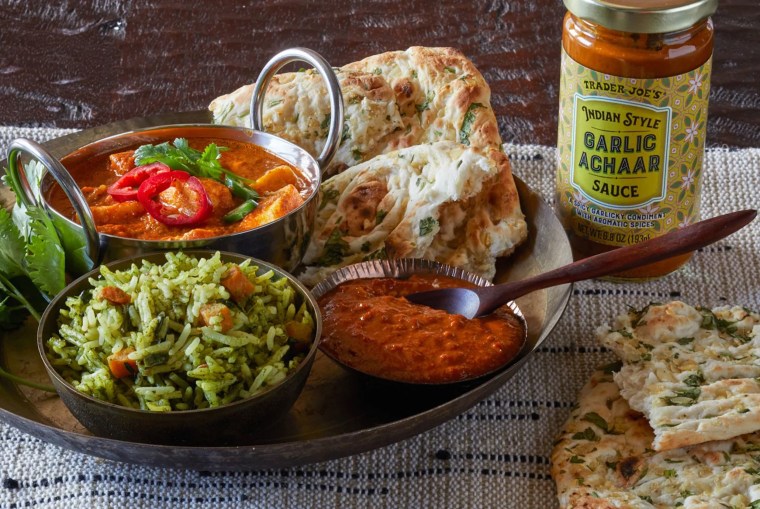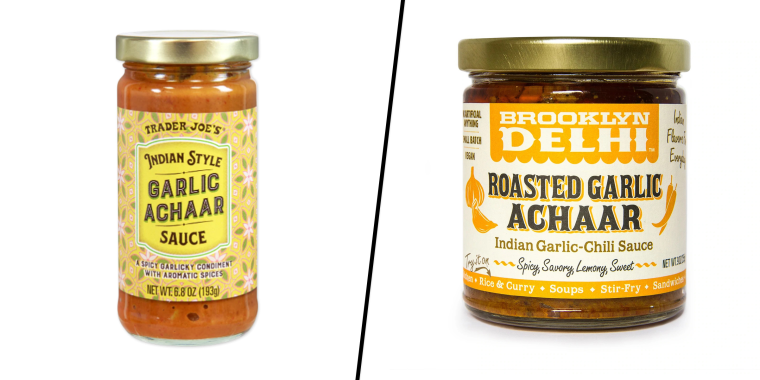When Chitra Agrawal first released her roasted garlic achaar, it was the only product of its kind on the market. The 42-year-old has been running her Indian condiment brand Brooklyn Delhi since 2014, and until she came around, no U.S. company sold an Indian garlic pickle quite like hers, she said.
“You don’t find roasted garlic achaar,” Agrawal told NBC Asian America, noting the garlic pickles she grew up eating were made raw. “That was my innovation.”
Brooklyn Delhi products are already housed in national chains like Whole Foods and meal-prep brands like Blue Apron, so Agrawal wasn’t surprised when she was emailed by Trader Joe’s last January. A representative for the grocery giant told her they were interested in her products.
After a group tasting, Trader Joe’s zeroed in on Brooklyn Delhi’s Coconut Cashew Korma, a mild simmer sauce. Things seemed to be moving along slowly; then communications stopped.
Three months later, customers and friends began flooding Agrawal’s inboxes. Trader Joe’s had released a new item. Called “Indian Style Garlic Achaar Sauce,” it was uncannily similar to Brooklyn Delhi’s bestselling product.

“Customers were saying, ‘Oh my God, your garlic achaar is at Trader Joe’s,’” she said. “I remember getting those messages. My heart just dropped.” A viral TikTok posted last week brought the issue back to the surface for a national audience, accusing Trader Joe’s of co-opting and watering down traditionally South Asian products. Social media has become a forum for conversation about cultural appropriation, and Indian Americans are pointing to the long history of brands whitewashing and marketing ethnic products.
Trader Joe’s did not respond to multiple requests for comment.
Karen Blakeslee, co-director at Kansas State University’s Value Added Food Lab, says the time it takes to develop a product at a major grocery store like Trader Joe’s is approximately two years, but a host of factors could impact that timeline. Those include a desire to meet consumer trends, recipe sourcing, package design and food safety testing.
The packaging and lettering on the Trader Joe’s jar bear a resemblance to Brooklyn Delhi’s simmer sauce products, but the biggest tell for Agrawal was the use of the word “achaar” itself. It’s uncommon for companies — even large Indian pickle brands like Pataks and Shan — to call their merchandise “achaar.”
Including in South Asian grocery stores, it’s more customary to see jars labeled “pickle” or even “relish.” Agrawal says she made the conscious choice not to do that.
“We specifically decided not to call it pickle because we thought Americans were going to confuse it with, like, a dill pickle,” she said. “And we’re the only U.S.-made Indian pickle brand sold widely in mainstream American markets that spells achaar with two A’s, which is what was on Trader Joe’s label.”
When Trader Joe’s initially contacted Agrawal by email, they discussed a range of products, including achaars, she said. But as pricing came up, the grocer honed in on her lower-end items.
“The garlic achaar is actually very expensive to make,” she said. “Given Trader Joe’s is very price-conscious, they were interested in two of our other products … Eventually it came to a standstill.”
The representative told Agrawal they were adding a different Indian product, so they had to put hers on hold.
It’s impossible to trademark a recipe, and with cheaper ingredients — like garlic paste instead of fresh roasted garlic — the grocer has significantly undercut Agrawal’s product.
Brooklyn Delhi’s achaar is priced at $12 a jar, while Trader Joe’s product is $2.69.
When it comes to accusations of appropriating traditional foods, Trader Joe’s has a history. In 2020, they famously said no to changing racist label names like “Trader Ming's” and “Trader Jose's,” which the grocery chain used to market pre-packaged Asian and Mexican foods.
“We want to be clear: we disagree that any of these labels are racist,” the company said in a statement posted on its website.
They recanted a few weeks later and agreed to change the names after a petition against them gathered thousands of signatures.
“While this approach to product naming may have been rooted in a lighthearted attempt at inclusiveness, we recognize that it may now have the opposite effect,” a representative said to The New York Times.
None of this was lost on Pragadish Kalaivanan, a TikToker based out of Boston, who read about the achaar controversy and decided to use his platform of over 55,000 followers to spread the story.
This story was originally published on NBCNews.com.
